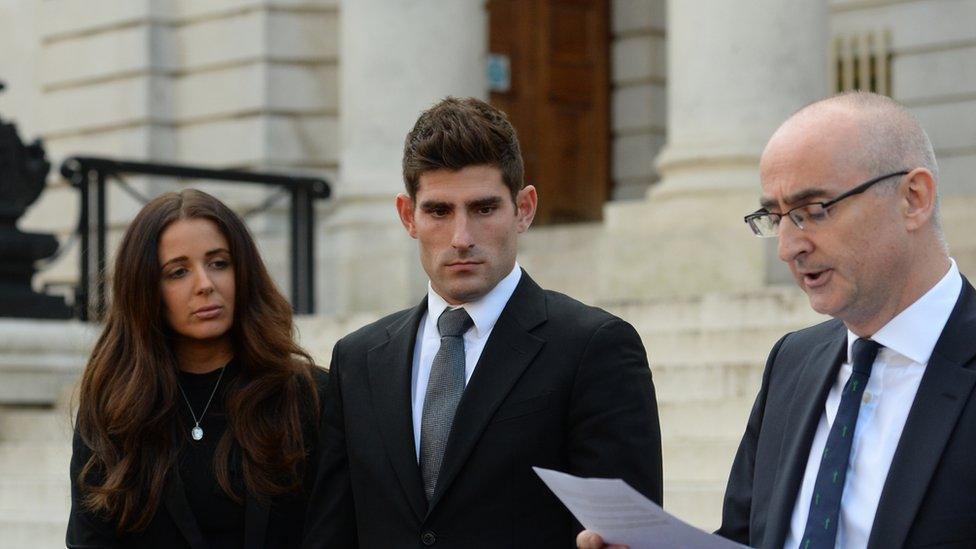Rape law review after footballer Ched Evans's trial
- Published

Ched Evans was accompanied to court by his fiancee Natasha Massey during his retrial
The law protecting alleged rape victims from disclosing details of their sex lives will be reviewed in the wake of Wales footballer Ched Evans's case.
The Chesterfield striker, 27, was cleared of rape at retrial last month.
Accusers do not normally have to disclose sexual history details to defence barristers, but the Court of Appeal said this case was exceptional.
Home Office minister Baroness Williams said concerns "should be looked at and we intend to deal with it".
In 2012, Mr Evans was found guilty of raping a 19-year-old woman in a hotel room in Rhuddlan, Denbighshire, the previous year. He served half of a five-year prison term.
That conviction was quashed on appeal in April and he was found not guilty of the same charge at the subsequent retrial after details of the complainant's sexual history were heard in court.
Baroness Williams told peers on Tuesday this was only permitted when "a strict set of criteria are met".
She added: "We are aware of the recent concern about the admissibility of a complainant's sexual history and wider perceptions about the law."
Lady Justice Hallett ruled Mr Evans's was a "rare" case in which it would be appropriate to allow "forensic examination" of the woman's sexual behaviour.

Ched Evans was signed by Chesterfield after his rape conviction was quashed but before his retrial and subsequent acquittal
Mr Evans, a former Wales international who was capped 13 times, always denied having sex with the woman while she was too drunk to consent.
He insisted she had agreed to let him "join in" while she was having consensual sex with fellow footballer Clayton McDonald, 27 - who was cleared of rape at the original trial - after a night out in Rhyl.
At Mr Evans's retrial, two other men said the complainant used similar phrases during sex to those the defence said were used when she had sex with Mr Evans and Mr McDonald.
Section 41 of the Youth Justice and Criminal Evidence Act 1999 imposes tight restrictions on details of an alleged victims' sexual past being presented in court, other than in exceptional circumstances.
Calls for a report into the operation of the legislation were made during the committee stage of the Policing and Crime Bill in the House of Lords.
Lord Marks, a Liberal Democrat peer and QC, said: "The point here and the point that we seek to have reviewed is whether, as a result of the Ched Evans case, there might be cases where the restrictive nature of Section 41 has or may be watered down and we need to look at how its operating.
"It is very important that rape gets reported and it is very important that the legislation in place is certainly as restrictive as we always thought Section 41 was and as the textbooks say it is.
"And the public concern is that this case seems to have weakened that protection."
- Published27 October 2016

- Published27 October 2016

- Published14 October 2016

- Published21 April 2016
